Just found one way to make it recursively and avoid double results. The code is pretty ugly cause I didn't have time to think how to use the loops here.
Public Function Permutacao(card1 As String, card2 As String, card3 As String, card4 As String, card5 As String, Optional card6 As String, Optional card7 As String)
Dim A(1 To 7) As String
Dim aux_A(1 To 7, 1 To 6) As String
Dim aux2_A(1 To 6, 1 To 5) As String
Dim final_A(1 To 42, 1 To 6) As String
n = 5
A(1) = card1
A(2) = card2
A(3) = card3
A(4) = card4
A(5) = card5
If Not IsMissing(card6) Then
A(6) = card6
n = 6
End If
If Not IsMissing(card7) Then
A(7) = card7
n = 7
End If
If n = 5 Then
final_A(1, 1) = A(1)
final_A(1, 2) = A(2)
final_A(1, 3) = A(3)
final_A(1, 4) = A(4)
final_A(1, 5) = A(5)
ElseIf n = 6 Then
k = 1
final_A(k, 1) = A(1)
final_A(k, 2) = A(2)
final_A(k, 3) = A(3)
final_A(k, 4) = A(4)
final_A(k, 5) = A(5)
k = 2
final_A(k, 1) = A(1)
final_A(k, 2) = A(2)
final_A(k, 3) = A(3)
final_A(k, 4) = A(4)
final_A(k, 5) = A(6)
k = 3
final_A(k, 1) = A(1)
final_A(k, 2) = A(2)
final_A(k, 3) = A(3)
final_A(k, 4) = A(6)
final_A(k, 5) = A(5)
k = 4
final_A(k, 1) = A(1)
final_A(k, 2) = A(2)
final_A(k, 3) = A(6)
final_A(k, 4) = A(4)
final_A(k, 5) = A(5)
k = 5
final_A(k, 1) = A(1)
final_A(k, 2) = A(6)
final_A(k, 3) = A(3)
final_A(k, 4) = A(4)
final_A(k, 5) = A(5)
k = 6
final_A(k, 1) = A(6)
final_A(k, 2) = A(2)
final_A(k, 3) = A(3)
final_A(k, 4) = A(4)
final_A(k, 5) = A(5)
ElseIf n = 7 Then
k = 1
aux_A(k, 1) = A(1)
aux_A(k, 2) = A(2)
aux_A(k, 3) = A(3)
aux_A(k, 4) = A(4)
aux_A(k, 5) = A(5)
aux_A(k, 6) = A(6)
k = 2
aux_A(k, 1) = A(1)
aux_A(k, 2) = A(2)
aux_A(k, 3) = A(3)
aux_A(k, 4) = A(4)
aux_A(k, 5) = A(5)
aux_A(k, 6) = A(7)
k = 3
aux_A(k, 1) = A(1)
aux_A(k, 2) = A(2)
aux_A(k, 3) = A(3)
aux_A(k, 4) = A(4)
aux_A(k, 5) = A(7)
aux_A(k, 6) = A(6)
k = 4
aux_A(k, 1) = A(1)
aux_A(k, 2) = A(2)
aux_A(k, 3) = A(3)
aux_A(k, 4) = A(7)
aux_A(k, 5) = A(5)
aux_A(k, 6) = A(6)
k = 5
aux_A(k, 1) = A(1)
aux_A(k, 2) = A(2)
aux_A(k, 3) = A(7)
aux_A(k, 4) = A(4)
aux_A(k, 5) = A(5)
aux_A(k, 6) = A(6)
k = 6
aux_A(k, 1) = A(1)
aux_A(k, 2) = A(7)
aux_A(k, 3) = A(3)
aux_A(k, 4) = A(4)
aux_A(k, 5) = A(5)
aux_A(k, 6) = A(6)
k = 7
aux_A(k, 1) = A(7)
aux_A(k, 2) = A(2)
aux_A(k, 3) = A(3)
aux_A(k, 4) = A(4)
aux_A(k, 5) = A(5)
aux_A(k, 6) = A(6)
c = 1
k = 1
While k <= 7
If k < 2 Then
final_A(c, 1) = aux_A(k, 1)
final_A(c, 2) = aux_A(k, 2)
final_A(c, 3) = aux_A(k, 3)
final_A(c, 4) = aux_A(k, 4)
final_A(c, 5) = aux_A(k, 5)
c = c + 1
End If
If k < 3 Then
final_A(c, 1) = aux_A(k, 1)
final_A(c, 2) = aux_A(k, 2)
final_A(c, 3) = aux_A(k, 3)
final_A(c, 4) = aux_A(k, 4)
final_A(c, 5) = aux_A(k, 6)
c = c + 1
End If
If k < 4 Then
final_A(c, 1) = aux_A(k, 1)
final_A(c, 2) = aux_A(k, 2)
final_A(c, 3) = aux_A(k, 3)
final_A(c, 4) = aux_A(k, 6)
final_A(c, 5) = aux_A(k, 5)
c = c + 1
End If
If k < 5 Then
final_A(c, 1) = aux_A(k, 1)
final_A(c, 2) = aux_A(k, 2)
final_A(c, 3) = aux_A(k, 6)
final_A(c, 4) = aux_A(k, 4)
final_A(c, 5) = aux_A(k, 5)
c = c + 1
End If
If k < 6 Then
final_A(c, 1) = aux_A(k, 1)
final_A(c, 2) = aux_A(k, 6)
final_A(c, 3) = aux_A(k, 3)
final_A(c, 4) = aux_A(k, 4)
final_A(c, 5) = aux_A(k, 5)
c = c + 1
End If
If k < 7 Then
final_A(c, 1) = aux_A(k, 6)
final_A(c, 2) = aux_A(k, 2)
final_A(c, 3) = aux_A(k, 3)
final_A(c, 4) = aux_A(k, 4)
final_A(c, 5) = aux_A(k, 5)
c = c + 1
End If
k = k + 1
Wend
End If
Permutacao = final_A
End Function
